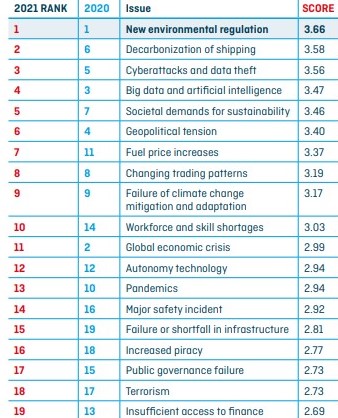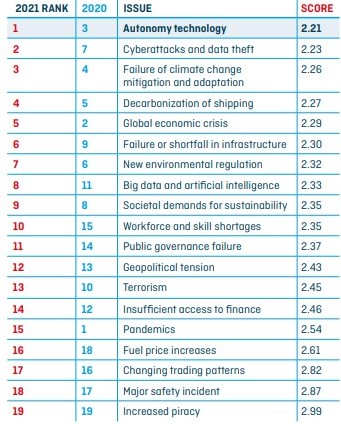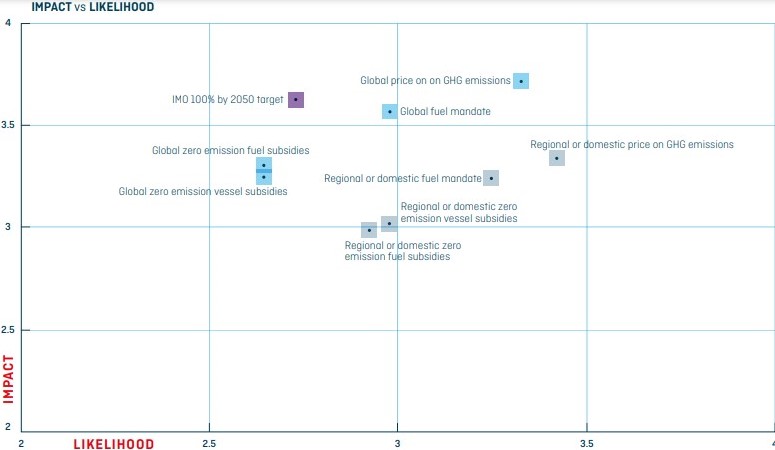Environmental issues top the list of concerns that will have the most impact in the coming decade for the global maritime industry, according to the latest Global Maritime Issues report.
Namely, leaders gained confidence in the maritime industry’s ability to manage pandemic risk – despite the many disruptions in supply chains, shipping, and global economies caused by COVID-19 in the past 18 months.
Survey respondents in 2020 ranked pandemic as the issue for which the industry was least prepared; however, in 2021 they placed it as one of the issues for which the industry was most prepared, reflecting the many months of intense focus.
Along with environmental concerns, survey respondents cited issues related to cyberattacks, sustainability, geopolitics, global economic crisis, and digitalization as being of particular concern. From these emerging issues will come the challenges and opportunities for the sector in coming years.
To provide a broad perspective, the survey and analysis found in this report come from a variety of sources. Survey respondents told which issues they believe are most likely to arise in the coming decade, which could have a high impact, and how well prepared the sector is to meet the challenges.

Impact of environmental issues increases
Environmental issues are top of mind for the marine industry in 2021. Decarbonization of shipping, new environmental regulation, and the failure of climate change mitigation and adaptation all scored high on their perceived impact and likelihood, and worryingly low on preparedness.
Respondents saw decarbonization of shipping as the most impactful issue, followed by new environmental regulation.
The potential for a global economic crisis dropped to the number three spot for impact in 2021, after having ranked as the number one most impactful issue for three consecutive years. It also fell considerably in terms of likelihood, and improved in terms of the industry’s preparedness.
This was only the second year the report listed pandemics as an issue in the survey, and respondents placed it fourth on the list of issues ranked according to their potential impact, after ranking it third last year. It is encouraging to see that, following a year of managing pandemic-related issues, respondents saw the industry as better able to manage them, and ranked it high in terms of preparedness.
We as an industry are now ready to rise to the challenge and play our part in combatting climate change. This is a change, which is undoubtedly driven by an increasing pressure from consumers, investors, financing institutions, and customers
says Christian M. Ingerslev, CEO of Maersk Tankers.
Likelihood of economic crisis seen as falling
For the second consecutive year, respondents saw new environmental regulation as the number one most likely issue to face the industry in the coming decade. Decarbonization of shipping, clearly related, placed a close second, moving up from sixth place last year as companies look for viable solutions.
Cyberattacks/data theft, and big data/artificial intelligence placed third and fourth, respectively. For cyberattacks and data theft this was a move up from fifth place.
Issues around workforce and skill shortages moved from being seen as the fourteenth most likely issue to tenth on the list, in all likelihood a result of the ongoing crew change crisis.
The biggest shift came regarding the perceived likelihood of a global economic crisis, which fell from second place in 2020 to eleventh in 2021. It’s worth noting that this year’s position harkens back to the issue’s pre-pandemic ranking; it placed tenth in 2019.
Pandemics once again ranked relatively low in terms of likelihood, falling to the thirteenth place from tenth last year. This remains a red flag if companies take the view that when COVID-19 is “done” a new pandemic is somehow unlikely.
Apart from the issues listed above, the largest move came in insufficient access to finance, which dropped to nineteenth from thirteenth last year. This coincides with the movement in global economic crisis.
The industry is missing out on the potential consequences of the heightening of the tensions between the US and China. It appears that this risk has not diminished with the Biden presidency [and] risks escalation on both sides, with spillovers for global trade, economic growth, and a joint problem to solve critical challenges, including the pandemic and climate change
stated Professor Ian Goldin of Oxford University.
Low preparedness on environmental and digital issues
Cyberattacks and data theft, on the other hand, rank second for the industry in lack of preparedness, a move up from seventh place last year. The issue also ranks seventh for impact and third for likelihood, underscoring the industry’s concern.
Respondents are also not very confident in the industry’s preparedness for the failure of climate change mitigation and adaptation, and the decarbonization of shipping. The two issues rank in third and fourth place for least prepared.
Pandemics preparedness had the biggest move year-over-year, shifting from first place to fifteenth among the issues for which respondents felt the industry was least prepared.
Respondents also feel better prepared for a global economic crisis, which moved from second place for least prepared in 2020, to fifth in 2021.
Organizations in the maritime sector are not alone in feeling unprepared regarding cyberattacks. While at one point in time the industry may have felt ‘insulated’ from targeted attacks, this is changing as vessels, ports, terminals, and other parts of the organization continue to upgrade their technology
mentioned Sarah Stephens, International Head of Cyber, Marsh
Increased piracy remains the issue for which the industry is seen as best prepared.
In general, it is not uncommon for organizations to have a gap between their internal perception of preparedness and their actual level of readiness, suggests a recent Marsh Risk Resilience Report. An accurate perception of organizational preparedness is necessary, because a false sense of security can halt an organization in its tracks.

Talent shortages loom
The impact and likelihood of workforce and skill shortages rank higher in the survey in 2021. At the same time, respondents feel the industry is less prepared to manage these issues.
There is little doubt the crew change crisis is a major driver of their perception, although other factors also influence the score. Since the start of the COVID-19 pandemic, thousands of seafarers have been stuck on ships beyond the expiry of their contracts as many countries decline to let them enter.
As of September 2021, the Neptune Declaration Crew Change Indicator estimates that 8.9% of seafarers are in this position, with 1.2% on board for more than 11 months post-expiry.
More than 800 organizations have signed the Neptune Declaration on Seafarer Wellbeing and Crew Change, which seeks to find an end to this crisis, in part by encouraging the vaccination of seafarers.
As recently noted by Jeremy Nixon, CEO of ONE, in a World Economic Forum article:
If left unresolved, the difficulties in carrying out crew changes could expand as seafarers understandably start considering if they want to return to sea, which could pose a threat to the resilience of global supply chains
Still, the longer the situation remains, the more impact it will have, not only on individual seafarers, but on the global economy.
The maritime industry may also experience workforce shortages on shore. Growing demands for diversity, equity, and inclusion (DE&I) could place an industry often viewed as “old-fashioned” in a difficult position when it comes to attracting talent.































































